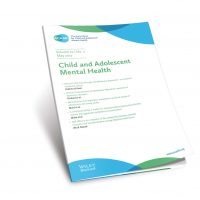Depression
-

No more to this ‘pitiful’ investment – A World Mental Health call from our chair
World Mental Health Day reminds us of the very large number of people who live with distress and anguish for long periods of their lives.
Read more -

CAMH Editorial: Volume 23, Issue 3, September 2018
“Antidepressants and the depressed adolescent” by Ian M. Goodyer
Read more -

Depression – Foreword from the Editor
Welcome to this edition of The Bridge which focuses on depression.
Read more -

Moving towards prevention as the intervention of choice for depression in children and adolescents
Are there sub-groups of children characterized by similarities in the development of depressive symptoms? And, if there are, could this be a basis for early intervention and prevention of depressive disorder?
Read more -

The overlap between low self-esteem and anxiety/depression in CAMHS
Our systematic review aimed to establish what is known about low self-esteem and anxiety/depression in young people (<18s). We wanted to find out whether young people with clinically significant anxiety disorders and/or depression also have low self-esteem as measured on validated questionnaires. We also wanted to know whether young people with low self-esteem as measured on a validated questionnaire develop depression and anxiety symptomology later in adolescence and young adulthood.
Read more -

Determining the “IMPACT” of therapeutics for depression requires an adaptive trial design
A large proportion of adolescents suffering from moderate-to-severe major depression respond to psychological and pharmacological therapy, and the range of effective treatment modalities is increasing. Now, Ian Goodyer and Paul Wilkinson have compiled a Practitioner Review that compares the various treatment options available and assesses their effectiveness for adolescents affected by major depressive episodes.
Read more -

Genetic factors influence the relationship between the home environment and onset of depressive symptom
Clinical depression is prevalent in adolescence, but how depression emerges and the nature of the early risk factors is unknown. Insight has now come from a study performed by researchers at King’s College London.
Read more -

Depression is highly prevalent but under-reported in children with ADHD
Researchers at Cardiff University have investigated whether the symptoms of depression observed in patients with attention-deficit/hyperactivity disorder (ADHD) differ from those reported in the general population.
Read more -

Accelerated cortical thinning correlates with early signs of depression
The brain undergoes structural changes as it develops over childhood, but whether abnormal structural changes are associated with emerging depressive symptoms in adolescence is unknown. Now, a longitudinal study that enrolled 205 participants aged 8-25 years without signs of depression has used magnetic resonance imaging (MRI) to monitor these brain changes over adolescence.
Read more -

How does my lived experience inform my nursing practice?
“Being a CAMHS nurse allows me to be creative and to try to incorporate the most memorable care I received into my practice.”
Read more